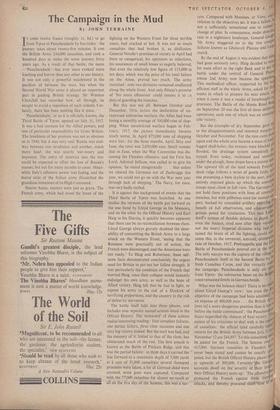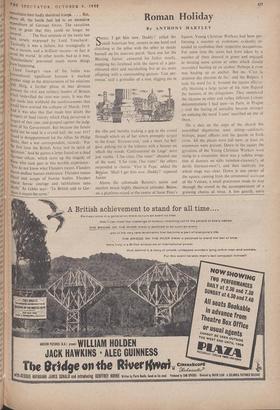The Campaign in the Mud
By JOHN TERRAINE
TT costs twelve francs (roughly Is. 8d.) to go 'from Ypres to Passchendaele by bus today : the journey takes about twenty-five minutes. It cost the British Army 244,000 casualties, and took a hundred days to make the same journey forty years ago. As a result of that battle, the name —Passchendaele'—has ever since evoked more loathing and horror than any other in our history. It was not only a powerful watchword in the pacifism of between the wars, but when the Second World War came it played an important part in guiding British strategy. Sir Winston Churchill has redorded how, all through, he sought to avoid a repetition of such ordeals. Cer- tainly, there has been nothing like it since.
'Passchendaele,' or as it is officially known, the Third Battle of 'Ypres, opened on July 31, 1917. It was a bad moment for the Allied powers, and one of particular responsibility for Great Britain. The loneliness of her position was not as obvious as in 1940, but it was very real. Russia was mid- way between one revolution and another, much more fatal; she was utterly war-weary and impotent. The entry of America into the war could be expected to offset the loss of Russia's masses, but not for many months to come. Mean- while Italy's offensive power was fading, and the moral state of the Italian army illmatched the grandiose intentions of its High Command.
Nearer home, matters were just as grave. The French army, which had stood the brunt of the fighting on the Western Front for three terrible years, had cracked at last. It was not so much casualties that had broken it, as disillusion.
General Nivelle's promises of victory in April had been so categorical, his optimism so infectious, his assurances of small losses so eagerly believed, that even the relatively low figure of 115,000 in ten days, which was the price of his total failure on the Aisne, proved too much. The army mutinied : only two divisions remained unaffected along the whole front. And only Petain's prom■se of `No more offensives' cOuld restore it to its duty of guarding the trenches.
But this was not all. Between October and December, 1916, before the declaration of un- restricted submarine warfare, the Allies had been losing a monthly average of 300,000 tons of ship- ping. When unrestricted warfare began in Feb- ruary, 1917, the. picture immediately became much worse. In April 875,000 tons of shipping were lost : for the three months, April, May and June, the total was 2,050,000 tons. Small wonder that in June, when the War Committee was dis- cussing the Flanders offensive, and the First Sea Lord, Admiral Jellicoe, was called in to give his opinion, 'he stated categorically . . . that unless we cleared the Germans out of Zeebrugge this year, we could not go on with the War next year through lack of shipping.' The Navy, for once, was very badly rattled.
It is against this background of events that the Third Battle of Ypres was launched. As one studies the versions of the battle put forward on the one hand by Lloyd George in his Memoirs, and on the other by the Official History and Earl Haig in his Diarie$, it quickly becomes apparent that there can be no reconciliation between them. Lloyd George always gravely doubted the desir- ability of committing the British Army to a large attack on the Western Front, 'seeing that the Russians were practically out of action, the French were discouraged, and the Americans were not ready.' To Haig and Robertson, these self- same facts demonstrated conclusively the urgent need for Britain to put out her fullest strength. It was particularly the condition of the French t4t worried Haig, since their collapse would instantly endanger his own army, as well as the hope of Allied victory. Haig felt that he had to fight, or expose his army to the risk of a Dunkirk of terrifying proportions, and the country to the risk of defeat by starvation.
The battle itself falls into three phases, and includes nine separate named actions listed in the Official History. The 'scorecard' of these actions makes interesting reading : four complete failures, one partial failure, three clear sucCesses and one very big victory indeed. But the start was bad, and the memory of it, linked to that of the close,-has obliterated much of the rest. The first assault is known as the Battle of Pilckem Ridge, and this was the partial failure : in three days it carried the line forward to a maximum depth of 3,000 yards at a cost of 31,000 casualties; several thousand prisoners were taken, a lot of German dead were counted, some guns were captured. Compared with the 57,000 casualties for almost no result at all on the. Iiist day of the Somme, this Was- a"suc cess. Compared with Messines, or Vim: , and . his main effort to the right flank and to b Put t relation to the objectives set, it was a failure, . not a sufficiently sensational one to comPel change of plan. In consequence, under drenehl rain in a nightmare landscape, General Godgb 5th Army staggered on to the two einPlet 1 failures known as Gheluvelt Plateau and Lang marck. By the end of August it was evident that thin had gone seriously awry. Haig decided lo Oil battle under the control of General Plum whose 2nd Army now became the spear' This methodical officer, supported by the IP efficient staff in the whole Army, asked i Or Ihr weeks in which to prepare his next attack, 3 when it came it was a model of forethought 3 precision. The Battle of the Menin Road Rid on September 20 was the first of three d liberal operations, each one of which was an u wits° able victory.
But the triumphs of dry September gave to the disappointments and renewed mi cries October and November. For the rain cane do%111 again and the whole area became a mass of WalcAf' logged shell-holes; the streams were blocked IP de flooded, the drainage system completely troyed. Even today, reclaimed and s] 00)10 under the plough, these slopes have a sinister 100' The upward lift of the land towards Passcilerl' daele ridge follows a series of gentle folds, Oil one presenting a bare skyline to the next anc19411 entirely exposed glacis up which the a: troops must climb in full view. The Gerriarls diud not hold these positions with lines of cc onecle
se
trenches, but with pillboxes sited for mutual port, backed by concealed artillery enjoying benefit of full observation, and countcr-altae' groups posed for retaliation. This was La" dorff's system of flexible defence in depth S°I even the Anzacs, tired now after their vict01ie5I nor the weary Imperial divisions who 1 ad 05. tamed the brunt of all the fighting, could over: come this, in the torrential, icesicold, obliterati4 rain of October, 1917. Poeleappelle and the 0Ast Battle of Passchendaele petered out in the ola"; The only success was the capture of the villa °I Passchendaele itself in the Second Baltic by t" fresh Canadian Corps, and this virtually elided the campaign. Passchendaele is only si X ruilej from Ypres : the submarine bases on the Belgian coast remained firmly in German hands. • What was the balance-sheet? There is no dOltb! about Lloyd George's view : 'not even I he tir5, objective of the campaign had been attained; an expense of 400,000 men . . . the British [was in] a more dangerous position than i was1° before the battle commenced'; 'the Passchendacic fiasco imperilled the chances of final victo Y easiest of his criticisms to deal with is the roatie' of casualties : the official (and carefully lestedA TO ) returns for the British Army between Y 3131/`; November 12 are 244,897. To this something 05. be added for the French. The Somme Cost IP 415,000. German casualties . in Flanders havc never been stated and cannot be exactlY puted, but the British Official History places 4 at upwards of 300,000. Certainly ;the Gerdy. accounts dwell on the severity of ttheir IOS lag their Official History sums up: 'The offensive l protected the French against fresh ( Jcsulaf' attacks, and* thereby procured them time tc:■'cr consolidate their badly shattered troops. . . . But, above all, the battle had led to an excessive expenditure of German forces. The casualties WCre so great that they could no longer be covered... . .' The final estimate of the battle has been tersely expressed by Lord Trenchard: actically it was a failure, but strategically it Was a success, and a brilliant success—in fact it saved the world.' In other words, bad as it was, 14sschendaele prevented much worse things from happening. Lloyd George's view of the battle was tremendously significant because it marked .another stage in the deterioration of his relations ,voth:
“a18, a further phase in that division
between the civil and military leaders of Britain -neh bedevilled the inter-war years. It was this that made him withhold the reinforcements that ‘•t-)Illd have averted the collapse of March, 1918. And it was also this that made him doubt the• Prospect of final victory which Haig perceived in August of that year, and grasped against the judg- nient of his Government. But because the future could not be read in a crystal ball, the year 1917 closed in disappointment for the Allies. Sir Philip Gibbs, then a war correspondent, records : Tor the first time the British Army lost its spirit of optimism.' And he quotes a letter found on a dead errnan officer, which sums up the tragedy of !IloSe who took part in this terrible experience: Vou do not know what Flanders means. Flanders gleans endless human endurance. Flanders means 1l°0(-1 and scraps of human bodies. Flanders ,inleans heroic courage and faithfulness unto uealh: As Gibbs says: 'To British and to Ger- mans it meant the same.'























































 Previous page
Previous page